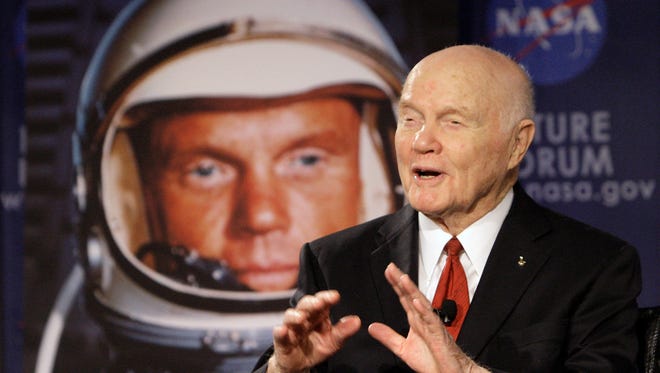John Glenn, the last hero: Bill Sternberg
As a politician, astronaut was the anti-Trump

As a skeptical journalist well versed in human foibles, I could count my heroes on one hand.
There was my dad, an Army veteran of World War II who died three years ago at age 89.
There was Carl Sagan, the brilliant astronomer who taught me about the cosmos in college and who died far too young, at age 62 in 1996.
There was Arnold Palmer, the swashbuckling golfer who epitomized class, who died in September at age 87.
And there was John Glenn, the first American to orbit the Earth, who died Thursday at age 95.
As heroes go, Glenn was the real deal. I was only 6 when he climbed aboard Friendship 7, circled the planet three times and endured a harrowing re-entry, but I remember being swept up in the excitement surrounding the Mercury space program.
After resigning from NASA in 1964, Glenn — who had survived 149 combat missions in two wars before he went into space — turned to politics, only to see his first run for a Senate seat from Ohio interrupted by, of all things, a serious accident in which he slipped on a rug and struck his head on a bathtub. Life can be funny like that.
Will the Rust Belt ever be great again?: Bill Sternberg
Glenn was finally elected to the Senate in 1974, where I met him when I was the Washington correspondent for more than a dozen newspapers scattered around Ohio.
As a politician, Glenn was, for better and worse, the anti-Trump. Low key. A workhorse, not a show horse. A moderate. An expert on difficult, important issues such as nuclear proliferation and weapons systems. A dedicated family man who stayed married to the same woman, his beloved Annie, for 73 years. Cordial to the press corps, he’d welcome us to his home in Potomac, Md., for holiday get-togethers.
For all his virtues, though, Glenn was not a very good candidate, which is why he never became president. When he sought the Democratic presidential nomination in 1984, I traveled with the campaign in the Deep South before the Super Tuesday primaries. Annie, who had overcome a severe stammer, was by his side.
Wherever he went, Glenn was roundly cheered and quickly surrounded by autograph seekers. But he had trouble translating his popularity into votes. His small-town Ohio values — “God and flag and motherhood and patriotism” — didn’t add up to a substantive platform.
His basic themes — a strong defense, lower deficit and bigger commitment to research and education — didn’t set voters’ hearts aflutter. His campaign was poorly organized. And his speaking style was charitably described as wooden.
America still needs space travel: Mark Kelly
Even Glenn acknowledged the problem. He told an audience in Alabama that one of his children was an anesthesiologist. “He puts people to sleep,” the senator said. “Like father, like son.”
The quip was emblematic of Glenn’s wry sense of humor. The scariest part of being an astronaut, he liked to say, was knowing that he was sitting atop a rocket built by the lowest bidder on a government contract.
After his failed presidential bid, which left his campaign millions of dollars in debt, Glenn continued serving in the Senate until 1998. At age 77, near the end of his fourth Senate term, he returned to space aboard the shuttle Discovery. The scientific rationale was a bit thin, but who could quibble?
Tom Wolfe, who memorably wrote about Glenn and his fellow Mercury astronauts in The Right Stuff, called Glenn “the last true national hero America has ever had.” That he was. And now, he too is gone.
Bill Sternberg is editor of the Editorial Page of USA TODAY. Follow him on Twitter: @bsternbe
You can read diverse opinions from our Board of Contributors and other writers on the Opinion front page, on Twitter @USATOpinion and in our daily Opinion newsletter. To submit a letter, comment or column, check our submission guidelines .